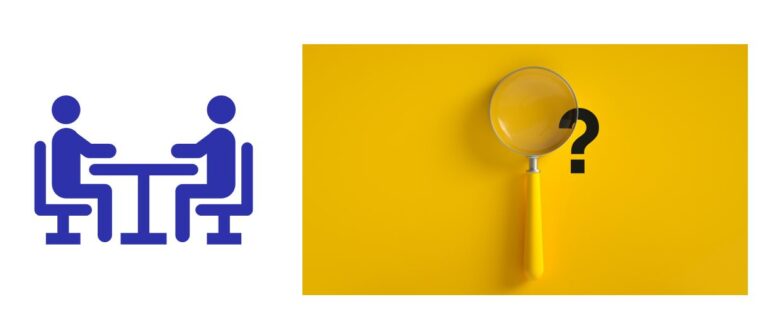‘How To’ Guide: Strategic Interview Questions to Ask Candidates + 35 Examples

In the competitive corporate landscape, hiring the right candidate is not just about assessing their technical skills. It’s more about understanding their mindset, problem-solving abilities, and how they align with your company’s culture. This is where strategic interview questions come into play.
These are not just queries about a candidate’s past work experience or academic qualifications. Instead, they delve deeper, exploring areas like decision-making skills, ability to handle conflict, and capacity for critical thinking.
This blog post will discuss the importance of strategic interview questions in the hiring process and provide you with a comprehensive list of such questions that you can incorporate in your next interview session. Stay tuned to discover how strategic questioning can revolutionize your hiring process and help you find the perfect fit for your organization.
Here are some helpful job interview related blogs
- Tackling the final interview round
- How to answer ‘tell me about yourself’
- What are your career aspirations
- Why do you want this job
- Why should we hire you
- Why are you leaving your job
- What are you passionate about
- Strengths and Weaknesses In Interview
- Interview questions for managers
- What is your management style
- Interview questions for freshers
- Tips to succeed in a job interview
- Types of interview questions
- Interview questions to ask candidates
- Behavioural interview questions
- Walk me through your resume
- What makes you unique
- What are your goals
- How do you handle stress and pressure
- Are you a team player
- How did you hear about this position
- Where do you see yourself in five years
- How do you handle stakeholders
The Role of Strategic Interview Questions
Understanding a Candidate’s Ability and Skills Through Strategic Questioning
Strategic interview questions are not your run-of-the-mill inquiries about qualifications or work history of job candidates. Instead, they delve deeper into the candidate’s abilities, skills, and how they react in different scenarios.
By posing thought-provoking situations or problems, you can assess their analytical skills, creativity, and ability to function under pressure. This approach provides a more comprehensive understanding of a candidate’s potential beyond what’s written on their resume.
Gaining Valuable Insights into a Candidate’s Problem-Solving Skills and Decision-Making Abilities
One of the significant advantages of strategic interview questions is their ability to shed light on a candidate’s problem-solving skills and decision-making abilities. When presented with a hypothetical situation or a past project, how a candidate navigated through challenges can tell you volumes about their critical thinking skills and how they handle difficult situations.
For instance, asking a candidate about a time when they had to make a tough decision on the job can give you a glimpse into their decision-making process and ethical standards.
How Strategic Interview Questions Help in Making Informed Decisions
The hiring process is a critical business decision with long-term implications for team dynamics and company performance. Strategic interview questions allow hiring managers to make more informed decisions by providing a deeper understanding of the candidate.
By uncovering how candidates have handled past situations, their approach to problem-solving, and their ability to adapt, strategic interview questions offer a fuller picture of the candidate’s potential fit within the organization. This approach reduces the risk of costly mis-hires and ensures that the chosen candidate aligns well with the company’s culture and values.
Types of Strategic Interview Questions

Basic Interview Questions
While they may seem simple on the surface, basic interview questions can be incredibly revealing when asked strategically. These questions typically focus on a candidate’s background, experience, and skills.
For instance, asking about a candidate’s most interesting project can provide insights into their passions and areas of expertise. Similarly, inquiring about their career development plans can give you a glimpse into their long-term goals and commitment to professional growth.
Behavioral Strategic Interview Questions
Behavioral strategic interview questions are designed to understand how a candidate behaves in certain situations based on their past experiences. They help you assess a candidate’s ability to handle various scenarios they might encounter in the role. These behavioral interview questions often start with phrases like “Tell me about a time when…” or “Can you describe a situation where…”.
They aim to reveal patterns in a candidate’s behavior, their decision-making process, and their ability to adapt to challenging situations. For example, asking about a time when they received critical feedback can show you their level of self-awareness and receptiveness to improvement.
Problem-Solving Interview Questions
Problem-solving questions are a key part of strategic interviewing. They allow you to evaluate a candidate’s critical thinking skills, creativity, and ability to handle pressure. These questions often involve presenting a hypothetical problem or challenge related to the job role and asking the candidate how they would handle it.
By analyzing their response, you can gain valuable insights into their problem-solving approach, their ability to think on their feet, and their potential fit for the role. For instance, asking how they would handle conflicting priorities or a complex challenge can show you their time management skills and ability to navigate complex challenges.
Strategic Interview Questions to Ask Candidates

Questions Related to Candidate’s Understanding of Company Culture
Understanding a candidate’s perception of your company culture can help assess their potential fit within the organization. One could ask: “What’s your ideal organizational culture?” This question allows the candidate to describe their preferred work environment and values, which you can then compare with your company’s culture.
If there’s alignment, the candidate is likely to feel more comfortable and perform better in the workplace.
Questions to Gain Insight into Candidate’s Self-Awareness
Self-awareness is a valuable trait that impacts a person’s ability to adapt, learn, and grow. An effective question could be: “Can you tell me about a time when something went wrong at work that was your fault? How did you handle it?”
This question encourages candidates to demonstrate self-awareness by acknowledging mistakes and showing their problem-solving skills and ability to take responsibility.
Questions to Assess Candidate’s Project Management Skills and Ability to Prioritize Tasks
A candidate’s ability to manage projects and prioritize tasks is crucial for roles that involve multitasking or leading initiatives. You might ask: “Describe a situation where you had to navigate through a complex project with multiple stakeholders.”
This question gives insight into their project management skills, their ability to juggle different priorities, and how they interact with various stakeholders. A successful candidate would have given you a well thought out response and you’ll know if they are making it up or speaking from experience.
Questions to Gauge Candidate’s Response to Workplace Conflict
Conflict is inevitable in any workplace, and how a candidate handles such situations speaks volumes about their interpersonal skills and emotional intelligence. A suggested question is: “Tell me about a time when you had to handle a conflict at work. What was the situation, and how did you resolve it?”
This question helps understand their conflict resolution skills, their ability to remain calm under pressure, and their capacity to work effectively with others, even in difficult situations.
Examples: Strategic interview questions to ask candidates
Here are examples of strategic interview questions for each type, please use this for inspiration and come up with your own versions of these.
Basic Interview Questions
- Can you tell me about a project that you’re particularly proud of and why?
- What skills or knowledge do you want to develop further in your career?
- How would you describe your communication style?
- What motivates you to perform at your best?
- Can you describe an instance where you took the initiative to improve a process or approach?
Behavioral Strategic Interview Questions
- Tell me about a time when you had to work under tight deadlines.
- Can you describe a situation where you had to deal with an unhappy customer or client?
- Have you ever faced a significant challenge at work and how did you overcome it?
- Can you share an example of when you received critical feedback and how you handled it?
- Describe a time when you had to adapt to a significant change in your work environment.
Problem-Solving Interview Questions
- If you were given a task with little to no direction, how would you handle it?
- Describe a situation where you had to solve a difficult problem. What was your approach and what was the outcome?
- How would you handle a situation where you have been given multiple tasks with the same deadline?
- Can you provide an example of a time when you had to make a quick decision with limited information?
- Suppose you’re working on a project that’s not going as planned. What steps would you take to get it back on track?
Questions Related to Understanding of Company Culture
- How do you define a positive company culture?
- Can you share an example of how you’ve contributed to your current/previous company’s culture?
- What types of company cultures do you thrive in and why?
- How would you handle a situation where a company policy contradicts your personal values?
- What aspects of our company culture attracted you to this role?
Questions to Gain Insight into Self-Awareness
- Can you describe a situation where you needed to ask for help?
- How do you handle criticism and feedback?
- What is one professional skill you’d like to develop and why?
- Can you share an instance where you recognized a weakness in your performance and took steps to improve?
- How do you ensure that you’re continuously learning and growing professionally?
Questions to Assess Project Management Skills and Ability to Prioritize Tasks
- Describe a project you managed from start to finish. How did you keep everything organized and on track?
- How do you prioritize your tasks when everything seems to be a priority?
- Can you share an example of a complex project you managed involving multiple stakeholders?
- What project management tools and techniques do you typically use?
- How do you handle changes or unexpected obstacles in a project?
Questions to Gauge Response to Workplace Conflict
- Describe a time when you had a disagreement with a coworker. How did you handle it?
- Can you share an experience where you helped resolve a team conflict?
- How do you handle situations where you disagree with your supervisor’s decisions or policies?
- What strategies do you use to prevent conflicts from arising in the workplace?
- Can you tell me about a time when you faced a challenging situation with a client or customer, and how you resolved it?
Using a Candidate’s Answer to Determine Fit

How to Analyze a Candidate’s Answer for Signs of Critical Thinking and Relevant Skills
When assessing a candidate’s critical thinking skills, it’s important to examine their ability to evaluate different viewpoints and use them to form viable solutions1. Some candidates may possess the necessary technical skills, but the way they analyze and respond to critical thinking questions can provide valuable insights into their problem-solving abilities and decision-making process.
For instance, if a candidate is able to explain their thought process clearly and logically, it’s a good sign that they have strong critical thinking skills. On the other hand, if a candidate blurts out an answer without being able to explain their reasoning, it may indicate a lack of thoughtfulness or analytical ability.
What a Candidate’s Resume and Answers Can Reveal About Their Career Aspirations and Motivations
A candidate’s resume and interview responses can offer significant insights into their career goals and motivations. For example, the progression of roles on their resume might indicate ambition and a desire for growth, while the projects they highlight could suggest areas of interest or expertise.
During the interview, you can also ask questions about their career aspirations, such as where they see themselves in five years or what motivates them in their work. Their answers can reveal whether they’re likely to be committed and motivated in the role you’re hiring for.
Why a Candidate’s Approach to Problem-Solving and Their Responses to Critical Feedback Matter
A candidate’s approach to problem-solving and their ability to handle critical feedback are key indicators of their potential success in a role. Candidates with exceptional problem-solving skills should be able to gather necessary information, analyze it, and form a solution.
Similarly, their response to critical feedback can tell you a lot about their mindset and potential to grow. Candidates who are open to feedback and show a willingness to learn and improve are often more adaptable and resilient.
Remember, the goal of strategic interviewing isn’t just to find a candidate with the right skills, but also to find someone who will thrive in your company culture and contribute positively to your team.
The Essential Part of the Hiring Manager in the Interview Journey

Utilizing Strategic Interview Questions to Identify the Right Talent
The hiring manager plays a pivotal role in the interviewing process. Using strategic interview questions, they can assess a candidate’s skills, experience, and cultural fit1. These questions are designed not only to gauge technical skills but also to uncover a candidate’s problem-solving abilities, work ethics, and ability to handle challenging situations.
For instance, behavioral questions like “Tell me about a time when you had to handle a difficult situation at work” can provide insights into a candidate’s problem-solving skills and resilience. Similarly, situational questions such as “What would you do if a client was unhappy with your product or service?” can help assess a candidate’s customer-service skills and their ability to handle criticism.
The Significance of Follow-Up Questions for a Deeper Understanding of the Candidate’s Abilities
Follow-up questions are an essential part of the interview process. They allow hiring managers to delve deeper into a candidate’s responses and gain a better understanding of their capabilities.
For example, if a candidate describes a project they led, a good follow-up question might be, “How did you handle any challenges that arose during the project?” This question can provide further insights into the candidate’s problem-solving skills and leadership abilities.
Another follow-up question could be, “What feedback did you receive at the end of the project, and how did you implement it?” This can give you a sense of how the candidate handles feedback and their commitment to continuous learning and improvement.
Through strategic questioning and thoughtful follow-ups, hiring managers can uncover the depth of a candidate’s skills and potential, making it easier to identify the right person for the job.
Wrap Up
To conclude, strategic interview questions serve as a powerful tool in the hiring process, contributing significantly to the selection of the most suitable candidate. They not only provide a comprehensive understanding of a candidate’s technical skills and experiences but also offer insights into their problem-solving abilities, adaptability, and cultural fit.
Hiring managers are strongly encouraged to incorporate these questions into their interview process. By doing so, they can gain a holistic understanding of a candidate’s capabilities, which goes beyond their resume.
These questions allow hiring managers to assess whether candidates can handle real-world challenges, how they react to feedback, and if their career aspirations align with the company’s vision.
Strategic interview questions have the power to streamline the hiring process effectively. They ensure that the chosen candidate is not just capable of performing the job tasks, but also aligns well with the company culture and values. This alignment is critical for long-term success and contributes to a harmonious and productive workplace.
In essence, strategic interview questions are more than just a recruitment tool; they are a means to build stronger, more capable teams that drive a company’s success. Therefore, they should be an integral part of every hiring manager’s toolkit.

Here are some helpful career/leadership related blogs
- Careers– Agile Coach, RTE, Product Owner, Scrum Master, QA Manager
- Career development plan
- Career growth
- Career change at 40
- Project Management
- Managing Managers
- IT Career switch
- Software Engineering career path
- Agility, Agile Testing
- Remote leadership / Leadership traits / Agile leadership
Other Productivity / Tools posts that may interest you
- Productivity
- Book summary apps – Headway App vs Blinkist vs getAbstract
- AI Writers: / Blogging – Jasper, Writesonic, Article Forge , Copy AI, Anyword, Writecream, Copymatic, Quillbot, Peppertype, Jasper AI (pricing) &
- Work From Home tools: Jabra
Author also writes at his Medium site.




![How To Answer Tell Me About Yourself Like A Pro + Examples [Nov 2023]](https://ilampadman.com/wp-content/uploads/2022/09/image-12.jpeg)
